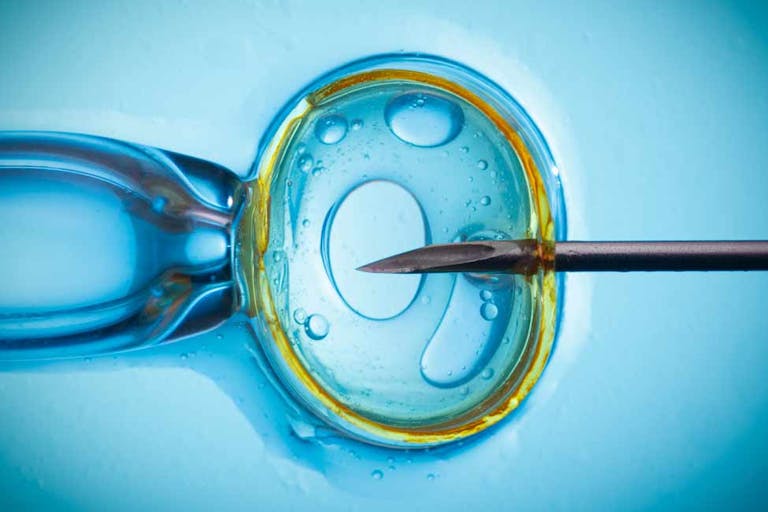
Abu Dhabi expands fertility industry to become 'IVF capital of the world'
Angeline Tan
·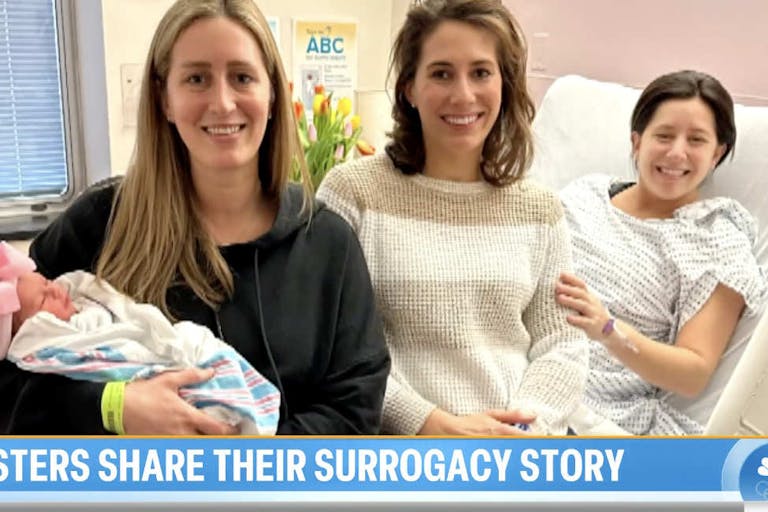
Human Interest·By Nancy Flanders
TODAY show followers react to sibling surrogacy story: ‘Not going to end well’
TODAY recently shared a story that host Hoda Kotb referred to as “sister goals,” except the story is getting pushback from viewers who predict that the situation will not end well. Research backs that theory up.
Jaclyn Fieberg and her husband Greg were told they would not be able to have children after undergoing seven unsuccessful rounds of in vitro fertilization (IVF) and suffering three miscarriages, creating countless embryos who lost their lives in the process. Testing revealed that Fieberg had endometriosis and a chromosomal condition that affected her fertility. After taking her money for multiple expensive rounds of IVF, her fertility doctor suggested she use an egg donor.
That’s where the story begins to read like a soap opera script.
Fieberg’s younger sister Meredith McIntyre volunteered to donate her own eggs. The sperm belonged to Fieberg’s husband, which meant her husband and sister would have a child together. But the first attempt was unsuccessful.
The doctor then suggested also using a surrogate — and this time, Fieberg’s older sister, Stephanie Corritori, volunteered.
That attempt led to a pregnancy with Fieberg’s older sister acting as the birth mother to a child biologically belonging to Fieberg’s husband and her younger sister. Though it isn’t mentioned in Fieberg’s story, the reason the egg donor is often not the same woman who acts as the surrogate is in attempt to deter the bond that forms between mother and child during pregnancy.
Baby Emersyn was born in February and the sisters visited the set of TODAY in March to share their story.
“I just hope she always knows how much we wanted her, that we were not willing to put it to rest until she was here,” Jaclyn told Kotb.
Reactions
TODAY shared the story in an Instagram post, which received both support and criticism.
@rooted.wings wrote, “So it is her niece by her husband’s sperm she is now raising. how confusing for this human who was bred and manufactured to fill an adult’s want.”
@lizzy121080 said, “She will be raising her niece. So now her husband and her youngest sister has a child together and will be bonded forever. This is not going to end well.”
Another commenter, @sarahym08, wrote, “So her sister who donated her OWN eggs gave up her biological child? I’ve seen this play out in real life, this doesn’t end well…”
@sabrinaksheehan wrote, “…if I had a husband, no way would I want him to have a child with my sister.. even if only in a test tube… just my opinion.”
Article continues below
Dear Reader,
In 2026, Live Action is heading straight where the battle is fiercest: college campuses.
We have a bold initiative to establish 100 Live Action campus chapters within the next year, and your partnership will make it a success!
Your support today will help train and equip young leaders, bring Live Action’s educational content into academic environments, host on-campus events and debates, and empower students to challenge the pro-abortion status quo with truth and compassion.
Invest in pro-life grassroots outreach and cultural formation with your DOUBLED year-end gift!
An adult who was adopted as a child said, “When did adoption stop being an option? I genuinely ask with love. I am a very loved and very happy adopted person. My mom didn’t go to her sisters to make a baby. She said we can’t, let’s bring a child into our life. No judgement [sic] to this persons story. But with science offering every option are we losing having incredibly loving families created through adoption.?”
Others suggested adoption as well. One wrote, “Adopt. There are so many kids in foster care… This is bizarre as it’s her niece.” Another said, “Yet there’s so many beautiful children in the foster program waiting to have a loving family and a home.”
@jen_labayen said, “I pray this goes well for them. I wish she would’ve considered adoption. This is a perfect example of how grown adults put their wants & desires above those of a child. None of us deserve children, and while i grieve for women who desperately want to be mothers, where do we draw the line between right and wrong? Imagine growing up knowing that your biological parents are your dad and aunt.”
READ: British MP calls for ban on surrogacy: ‘We have a duty to protect children’
Research supports the negative comments
Research suggests that these comments are right on the money. Eight-five percent (85%) of donor-conceived individuals who took part in a Harvard study reported a shift in their “sense of self” upon learning about the nature of their conception. Individuals who participated in the study reported significant distress upon learning about the means of their conception, and about half sought psychological help in order to cope.
The same study revealed that 62% of the now-adult children conceived through donor technologies, including surrogacy, believe it to be unethical and immoral. They feel like business transactions. One woman told the pro-child organization Them Before Us, “Somehow, somewhere, my parents developed the idea that they deserved to have a baby, and it didn’t matter how much it cost, how many times it took, or how many died in the process. They deserved a child. And with an attitude like that, by the time I was born they thought they deserved to have the perfect child… as Dad defined a perfect child. And since they deserved a child, I was their property to be controlled, not a person or a gift to be treasured.”
Another woman conceived via a surrogate who used her own eggs shared that she always struggled to bond with the mother who raised her. “Why, you might wonder, when my parents went to such lengths to have me, did I not feel showered with love?” she asked. The trauma of learning the circumstances of her conception led her to become self-destructive, depressed, and suicidal.
In addition, studies have shown that taking babies from their birth mothers — whether they are biologically related or not — causes immense trauma for the baby and can permanently alter a child’s adult brain function later in life. This is the case even with adoption, which seeks to give a child a family when that child cannot be raised by his or her birth mother. Surrogacy, however, deliberately creates a child, knowing he or she will lose the birth mother. Surrogacy knowingly creates trauma because it has the goal of separating a baby from her birth mother.
When it comes to siblings donating eggs or sperm to siblings, relationships can be ruined. One woman whose husband gave his sperm to his brother and sister-in-law told The Atlantic that their relationship with the other couple became “very formal.” She later learned from a reproductive specialist that this is common. “I was just like, ‘Gosh, why hasn’t someone told us?’ Why was nobody saying, ‘This is a big deal, and it’s going to test the limits of your relationship’?” she said. “No doctor working at the cryogenic bank, nobody—nobody said, ‘Hey. Sit down. Think about the relationship and what’s gonna happen.’”
The current trend in society appears to be to believe that the level of “wantedness” an adult feels for a child will directly determine their child’s well-being and happiness. The thought is that knowing they were “wanted” will be enough for a child to not care that their parents spent tens of thousands of dollars and went outside of their marriage trying to create a baby.
The Fiebergs’ desperation for a baby with a genetic link led them to create a child who will likely face an identity crisis, a child for whom they may hold the expectation that she should be nothing but grateful because of everything they did to create her.
Now that Fieberg and her husband have Emersyn and are coming down from the high-running emotions associated with the process of IVF, only time will tell how their decisions ultimately affect their immediate and extended family, especially Emersyn.
Live Action News is pro-life news and commentary from a pro-life perspective.
Contact editor@liveaction.org for questions, corrections, or if you are seeking permission to reprint any Live Action News content.
Guest Articles: To submit a guest article to Live Action News, email editor@liveaction.org with an attached Word document of 800-1000 words. Please also attach any photos relevant to your submission if applicable. If your submission is accepted for publication, you will be notified within three weeks. Guest articles are not compensated (see our Open License Agreement). Thank you for your interest in Live Action News!

Angeline Tan
·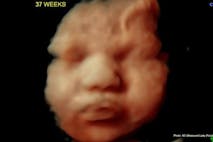
Politics
Nancy Flanders
·
Human Interest
Angeline Tan
·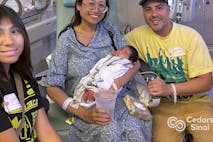
Human Interest
Bridget Sielicki
·
Human Interest
Nancy Flanders
·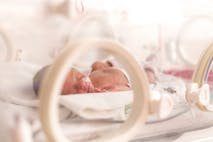
Human Interest
Nancy Flanders
·
Politics
Nancy Flanders
·
Activism
Nancy Flanders
·
Issues
Nancy Flanders
·
Human Interest
Nancy Flanders
·
Investigative
Nancy Flanders
·